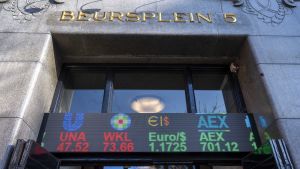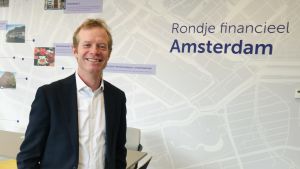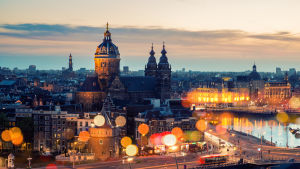The Dutch capital, Amsterdam, is seeing an influx of people and capital following Brexit. It is European Union rules that have forced some stock trading to move out of the London Financial Center. Many British students, in turn, chose to seek refuge on the continent in hopes of better future opportunities.
Amsterdam
When the recent divorce between the European Union and the United Kingdom was a reality, 23-year-old Ole Charlton realized the door was closing in front of him.
It was a matter of choosing between staying in a more isolated island kingdom or investing in a new life outside the UK.
The choice fell on the Dutch capital.
I am one of the last Britons to take advantage of the opportunity to apply for a residence permit after Brexit, Charlton tells the Swedish Yle website.
The transitional period guarantees rights
By settling in the Netherlands in August of last year, Charlton got the opportunity to live and study in the Netherlands on the same terms as European Union citizens.
The transitional period agreed upon between the European Union and the United Kingdom regarding Brexit will guarantee the rights of British citizens who choose to settle in one of the 27 EU countries before the end of 2021.
It’s almost like an English speaking city. You don’t have the same challenges as if you had moved to Paris or Brussels
For Charlton, the decision to move to Amsterdam resulted in great financial relief.
In the Netherlands, it pays around € 2000 per semester for master’s studies in urban planning. In the United Kingdom, the equivalent studies fee is £ 15,000.
A multicultural city where everyone speaks English
In addition to Master’s studies, Charlton also studies Dutch. He tries to use language in everyday life to run on routine.
Practically speaking, most things still work in his native language.
It’s almost like an English speaking city. You don’t have the same challenges as if you had moved to Paris or Brussels.
There is no cultural barrier as 95% of the population speaks your language.
Many British people are applying to European Union countries
Charlton says there is a British group of “Brexpats” in Amsterdam that has chosen to leave the United Kingdom, which has turned its back on the European Union.
It’s common for Brexit refugees to feel that the European Union is currently offering them better opportunities is the United Kingdom.
There is a nice community of people who share the same experience in making decisions in their lives and they don’t have much of what holds them back.
Although Charlton is horrified by the decision to leave the European Union, he feels he is home to Britain. At the same time, he feels that the European Union is currently offering better opportunities for study and work.
– I want to stay on the continent.
Stock trading moves to Amsterdam
The effects of Brexit are also being felt in the financial market. Recent statistics show that Amsterdam has ranked London as the leading trading place for European stocks.
Since the beginning of the year, trading volumes on the Amsterdam Stock Exchange have quadrupled.
Jonathan Zeitlin is Professor at the University of Amsterdam.
Professor Jonathan Zeitlin. He is a middle-aged man. The photo was taken outdoors. It’s still early spring in Amsterdam and it’s raining.
Bild: Ricard Hoso
It would be a loss if you looked at volumes that are trading more than physical jobs, but over time we can expect jobs to follow trade at least to some extent, says political economics professor Jonathan Zeitlin.
Zeitlin believes that the development came as a result of the United Kingdom’s non-compliance with European Union rules. With the European Union demanding that shares be traded in Euros within the Union, a flight from London is inevitable.
Paris, Frankfurt and Dublin compete for the cake
Paris, Frankfurt, Dublin and Frankfurt are among the cities to take jobs from London.
“The private parts that land in Amsterdam depend on a variety of factors: the infrastructure, the quality of local regulations, the fact that a lot of English is spoken in Amsterdam and the transport works,” says Zeitlin.
At the moment, there is a great deal of uncertainty about what the relationship between the European Union and the United Kingdom will look like in terms of financial services. What could result from it?
Britain’s exit from the European Union has already forced financial firms in the United Kingdom to draw up contingency plans to see if it is not possible to do business in London in an efficient and profitable manner.
It gradually leads to the establishment of activities in other European countries instead.
Zeitlin notes that it is still too early to quantify the long-term impact on London. Much depends on how the relationship between the European Union and the United Kingdom evolves.
But it is clear that the time when London was operating as an offshore center for investments from the eurozone is coming to an end, according to Zeitlin.

The Amsterdam Stock Exchange is thriving on the pavilions of Brexit.
The outer part of the Amsterdam Stock Exchange.
Photo: EPA-EFE / All Over Press
More than a thousand new jobs
A feature of the development in recent months is that it took place without the active effort of Amsterdam or the Dutch authorities.
In this respect, Amsterdam, for example, differs from Paris, as it worked purposefully to take jobs from London.
As for Amsterdam, it’s big. We are talking about a thousand to two thousand direct jobs that have moved here
Dutch financial authority AFM confirms that so far only a small portion of London’s huge financial sector has moved to Amsterdam, despite the fact that the volume of shares traded is large.
– But it is big for Amsterdam. We are talking about between 1,000 and 2,000 direct jobs transferred to Amsterdam, says Sander van Lijenhorst, director of the program for Brexit issues.
– Regarding that, we also have people working as consultants or legal who move to Holland and Amsterdam.

Sander van Lijenhorst is responsible for Brexit issues at the Dutch Financial Authority.
Sander van Laijenhorst is the head of Brexit at the Dutch Financial Authority. He is a man of his younger middle age, wearing a jacket and shirt without a tie.
Bild: Ricard Hoso
More work for the authorities
With the increase in trading volumes, comes the increased responsibility of the Dutch authorities, says Van Laijenhorst.
– That means more work for us.
At the same time, the influence of the Dutch authorities is increasing at the European Union level within the institutions that work with financial regulation.
Will the evolution cause European financial cities to become more specialized?
It seems that there is a specialization going on. In Amsterdam, it mostly relates to stock trading. In Paris and Frankfurt it is more about banking, while Dublin and Luxembourg focus on managing money, says Van Laijenhorst.
So it is more about the integration of each other than the strong rivalry between cities.

“Extreme tv maven. Beer fanatic. Friendly bacon fan. Communicator. Wannabe travel expert.”










More Stories
Brexit brings economic uncertainty – Finland worst hit in the long run – Hufvudstadsbladet
Britain wants closer ties with the European Union.
Britain may already be out of recession